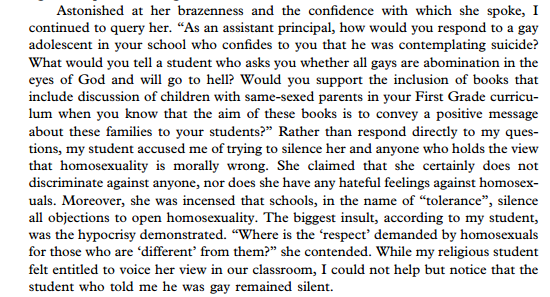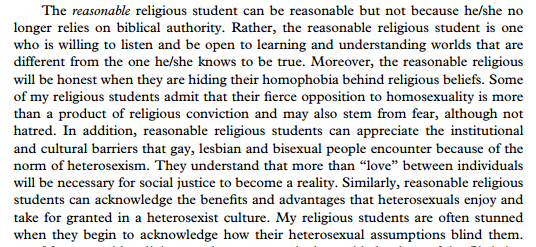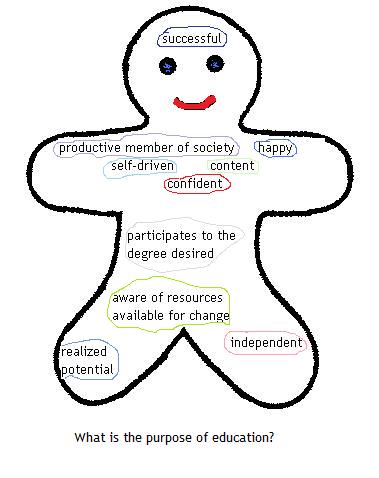This is an interesting piece in retrospect, because of the collapse of the culture wars. You can see my skepticism of the argument: people who I considered extremists were arguing that it was fair to shut down the speech of anyone they considered the “dominant ideology”. If anyone met any one of the adjectives “white”, “male”, “heterosexual” (god, such a quaint word these days) or “Christian”, then the teacher should shut these students down aggressively, not allowing them free speech or support. Both then and now, I find such thinking incomprehensible and repellent—and certainly, my opinion isn’t a popular one six years later. What was once an extreme view is now pretty mainstream. These days, the woman who thinks homosexuality a sin would probably be expelled, not just shut down by her professor. And far too many people would think my objections evidence that I also have evil thoughts, as opposed to a strong belief that opinions can’t subjugate.
Moving from the specific to the general: many ed school critics would see this piece as evidence of brainwashing, of the sort of timewasting crap that ed schools perpetrate instead of time well spent covering best practices (thus ignoring the pesky reality that teaching has no best practices).But what I’m struck by most of all, rereading and remembering the day, is that we weren’t told what to do. Those of us who thought that was nonsense weren’t shut down, at least by that professor. The class objective was for us to think about what we’d do as teachers when a student said something that shocked us, when we had to make decisions about what dialogues to encourage, which to shut down. Or, as Kate Walsh says disapprovingly, STEP didn’t try to train us, but rather prepare us for teaching challenges. I did think about it, prepared, and have found that preparation invaluable over the years–without ever once changing my opinion about Applebaum and Boler. And yes, managing student discourse is an essential teaching practice, one I really hadn’t given much thought to before this class.
Do I think STEP wanted us to take Applebaum’s side? Well, I think they tried to restrict their admissions to people who already agreed with Applebaum. However, from a pedagogical standpoint, I am fully on board with the class objective, even though I would have taught it quite differently. Once again, there’s more to ed school than its critics understand.
But even now, I can’t justify the gingerbread man.
And now, day one of Equity, Democracy, and Education. AKA Social Justice.
I am keeping an open mind on the subject, as our section leader seems pretty unshockable. We discussed H.G. Wells Country of the Blind and applied it to the classroom. Is the sighted man who is handicapped by living in a blind society the student entering an alien culture, or the teacher entering an alien classroom? I could brief both ways, but ultimately see Nunez as the teacher who refuses to use all of his power to subjugate the culture, even though he could (not everyone agreed that he could).
We touched on David Tyack’s “Constructing Difference: Historical Reflections on Schooling and Social Diversity” but spent much more time on Barbara Applebaum’s Social Justice, Democratic Education and the Silencing of Words that Wound. Really, where do they get these titles?
Applebaum is speaking out in support of Megan Boler’s affirmative action pedagogy, which for some reason we weren’t assigned.
Boler argues that teachers can and should shut down the students who are members of the dominant culture if they don’t express sympathy for oppressed classes.
(except when they’re gay, she says later)
Applebaum agrees with Boller. Actually, what happened is that a white, Christian student of Applebaum’s said that she’d have no problem working with homosexuals because she “loved the sinner, even if she hated the sin.”
Applebaum, by her own admission, lashed into this student.
So after the fact, Applebaum realized she might have abused her authority, oh, just a friggin’ TAD–even if it was in a good cause, like shutting down a purported bigot who did nothing more than explicitly say that she wouldn’t discriminate against gays. But instead of just saying so, she spends an essay rationalizing her behavior in the name of affirmative pedagogy.
“Speech that supports and is supported by dominant ideology becomes, at the moment of its utterance, the reproduction of power.”
In short, an opinion can subjugate and subordinate.
The teacher asked us if we agreed. I said “No, of course not.”
Someone said, “You don’t think opinions can subjugate?”
“Absolutely not–and please, don’t let my opinion subjugate anyone here.”
I could tell from the body language in the room that some (but not all) of the class disagreed. But we let that all pass by.
At one point, Applebaum tries to analogize her Orthodox Jewishness to homosexuality. The Christian student didn’t call her a sinner, because it was less acceptable to be anti-Semitic. P points out how odd it was that, in an article focused on power relationships, she didn’t acknowledge that the student might not have called her a sinner because as the teacher, she might have more power.
Several students pointed out that her goal was to show that there were acceptable and unacceptable forms of bigotry, and so it didn’t matter if her analogy was apt because her larger point was on target. (Sez you, thinks I.)
A good number of other students argued that her entire determination of who is “powerful” and who isn’t is extremely problematic. I was much cheered to see that this was an actual debate, but I fear that all these skeptical opinions may be subjugating the dissenters.
By far the most aggravating aspect of Applebaum’s article, by the way, is her open bigotry towards Christians, who she refers to as “religious” people–ironic, given that Applebaum is an Orthodox Jew.
So since Applebaum, an orthodox Jew, is presumably “religious”, who does she mean here? The class agreed with my observation that she doesn’t really mean “reasonable people” but “reasonable Christians”. And of course, to people of Applebaum’s ideology, Christians who aren’t “reasonable” are of the evangelical ilk. But she doesn’t say say “non-evangelical, reasonable Christians” because it would lay her bigotry out there in the open.
The teacher agreed that she was explicitly saying that dominant cultures must be held to standards that oppressed cultures must not.
So presumably, Muslims can be religious bigots in America. Back in the Middle East, though, their teachers should be shutting them down cold and oppressing them in the name of affirmative action pedagogy.
After that, we were given a blank gingerbread man–ironically, the paper was white so the point was lost. Then we had to label the figure with the goals we think are the purpose of education.
Can I ask WHAT IS THE PURPOSE OF THIS GINGERBREAD MAN?




